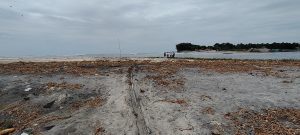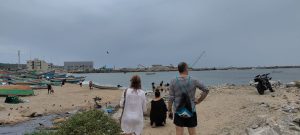A cross-section of people who met Rahul Gandhi during the yatra said nobody else has attempted to listen to them so far.

Rahul Gandhi during the Bharat Jodo Yatra in Kerala. (Supplied)
Septuagenarian A Anandavalli of Thottappilly in Kerala’s Alappuzha district has to struggle to contain her emotions while recalling her meeting with Rahul Gandhi almost a month ago, when he arrived in her village leading the Bharat Jodo Yatra.
“I never thought such a national leader would hold my hands and console me by patting my shoulders when I told him how much we suffer due to the illegal mining of mineral sand from the coast where we have dwelled for so long,” she recalled.
“I initially hesitated to talk to him in Malayalam. But someone who came with Rahul Gandhi prompted me to say whatever I wished to convey, and he translated it for him. This was the first time I found a leader who listens to ordinary people like me,” said the fish vendor.
Anandavalli, for two years now, is also a member of the local action committee that has engaged in an indefinite protest against illegal mining activities citing livelihood and environmental issues.
During its Kerala leg, the yatra passed about 17 km between Valiyzhikkal and Thottappilly, a coastal stretch known for vast sand dunes rich in minerals like ilmenite, rutile, zircon, monazite, leucoxene, sillimanite, and garnet.

Mineral sand mining at Thottappilly beach against which Rahul Gandhi offered solidarity. (K A Shaji/South First)
Indiscriminate mining of mineral-rich sand is happening in these areas, with the connivance of Kerala’s LDF government, says the local community.
Members of this community, along with experts, say this is the reason for the large-scale sea erosion in the area, which is destroying housing and the fishing industry.
It is also cited as the reason behind saline water incursion into the paddy fields of Alappuzha and Kuttanad, resulting in huge losses to cultivation.
“Throughout my life, I constantly criticised the Congress and Rahul Gandhi. But now I am a changed person as he came to our agitation venue, spent time with us, and listened to our grievances,” said S Suresh Kumar, chairman of the action committee against the mining activities.
“We found him well-informed, and his responses were sensible. He even promised us legal support in carrying forward this genuine agitation which reflects the reality of the affected community without adding any political colour,” he added.
According to Suresh, no other political party or leader has so far attempted to listen to the community and show solidarity.
In Alappuzha, retired tahsildar B Bhadran shared a similar view.
“In Kerala, the major political formations were never ready to listen to civil society movements. They were together in protecting corporate interests. Environmental and livelihood concerns were never part of their agendas,” said Bhadran.
“When I met him at Kalpakavadi, where he stayed, Rahul Gandhi astonished us by sharing his thoughts on the coastal climatic crisis, the adverse impacts of mineral sand mining, and burning agricultural issues of the traditional rice bowl of Kuttanad. I found him quite sensible and forward-looking,” he recalled.
“This is the first time such a big leader attempted to listen to the people and understand their grievances. He must have limitations as his party is not in power at the centre and in the state. He may not be able to influence policy decisions. But undoubtedly, he boosted the morale of people across the state who fight for their rights,” said Bhadran.
At Balaramapuram, the weavers’ hub of Kerala capital Thiruvananthapuram, handloom textile dealer R Muthukrishnan has a different perspective on the yatra.

The Adani-promoted transhipment terminal at Vizhinjam on which local protestors sought the support of Rahul Gandhi. (K A Shaji/South First)
“I have no difference of opinion with Rahul Gandhi as he is a good personality. His yatra is also upholding certain values. But the biggest challenge is how he can translate it into action plans that can impact programmes and policies,” he said.
“I am not sure the Congress, with its weak organisational machinery, can come to power back at the Centre and in the state. People in the party might have good ideas, but their implementation remains challenging,” added Muthukrishnan.
Kerala’s leading environmental activist Anita Sharma, too, feels the yatra needs strong and planned follow-up actions.
“I agree that no other Indian leader is bothered about the environment, livelihood, agricultural workers, fish workers, and those who are being pushed to the boundaries. But even the Congress lacks leaders of similar convictions. If the Congress can transform the experiences gained through the yatra into an action plan that inspires public confidence, that would be good for the country’s future. But in present-day India, I am not very hopeful,” she said.
Social activist AJ Vijayan, who works among the fishing community on the Thiruvananthapuram coast, has hopes from Rahul Gandhi, who met and listened to the fisherfolk of Vizhinjam, who are protesting against the Adani Group-promoted under-construction multi-crore international transhipment terminal on environmental and livelihood grounds.
“It was the previous Congress government led by Oommen Chandy that awarded the project to Adani, and thus caused irreparable damage to the coastal livelihood and environment. But when the agitating community wanted to meet him, Rahul Gandhi facilitated the meeting, listened to them, and directed the state unit of the party to reach a clear-cut decision on the Vizhinjam imbroglio. It indicates his honesty and the ability to act beyond partisan politics,” said Vijayan.
Tinto K Edayadi of the Kuttanad Karshaka Sangham, a farmers’ body active in low-lying traditional rice bowl Kuttanad, put the situation in context: “Above all, the Congress is the main Opposition party both at the national level and in Kerala. And no alternative can be possible in the country without Rahul Gandhi. So, we thought of meeting him and sharing our concepts when he reached our locality. We have very few leaders with an inclusive vision now. And he is undoubtedly one among them.”
He added: “The yatra is not a panacea for all grievances faced by the country. But it’s a significant step in the right direction. We expect similar initiatives from other leaders, too.”
Transgender persons, tribal communities, dalit outfits, and other segments of civil society whom Rahul Gandhi met during the yatra feel the engagement was distinct, but the road ahead is long.

Apr 26, 2024

Apr 26, 2024

Apr 26, 2024

Apr 26, 2024

Apr 25, 2024

Apr 25, 2024